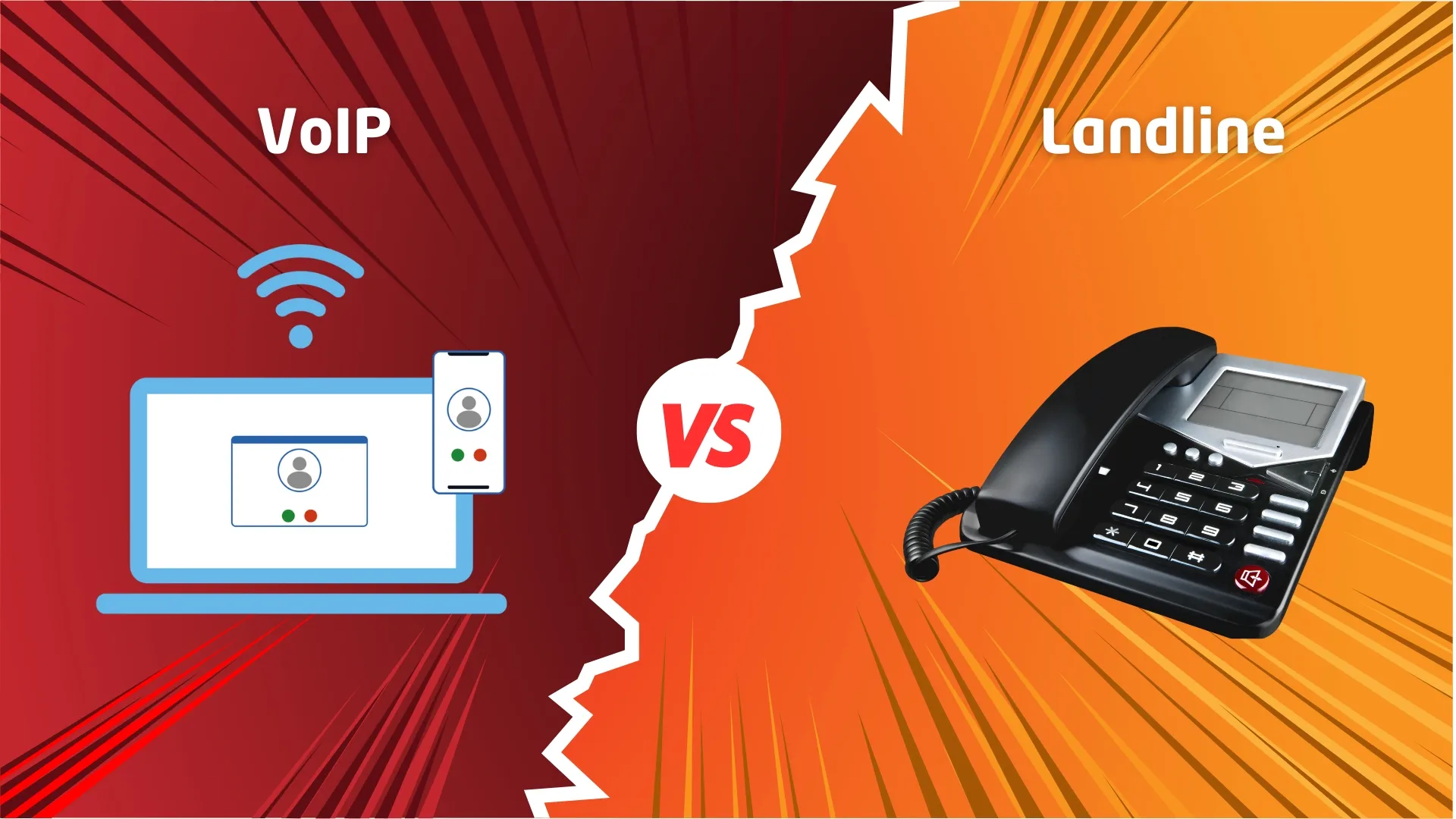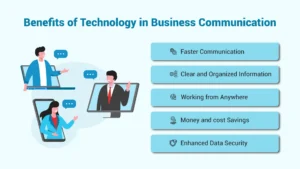In today’s hyper-connected world, communication is the lifeblood of any business. Whether you’re sealing deals with international clients or handling internal calls between teams, having a reliable phone system can make or break your operations. But when it comes to selecting the right communication tool, the age-old battle of VoIP vs. landline continues to be a hot topic.
Years ago, there was no choice: if you wanted a phone system for your business, you simply had to install a landline. But with the rise of the internet and the advent of VoIP technology, things have changed. Suddenly, businesses are faced with options—do you stick with the tried-and-true landline system, or leap into the future with a more modern VoIP setup?
In this blog, we’re going to break it all down for you. From understanding how each technology works to comparing costs, security, and features, we’ll help you figure out which option is best suited to your business needs. So, buckle up, and let’s dive into the world of VoIP vs. landline!
What is VoIP?
Let’s kick things off by breaking down what VoIP is. Short for Voice over Internet Protocol, VoIP is a technology that allows you to make phone calls using the Internet rather than traditional phone lines. Sounds futuristic, right? It’s a bit like sending an email instead of a letter—just much faster and more efficient.
Here’s how it works: Instead of converting your voice into electrical signals and sending it over copper wires like a traditional phone, VoIP turns your voice into small packets of data. These packets travel over the internet to reach the person you’re talking to, where they’re reassembled into sound. This technology enables you to make phone calls from computers, smartphones, VoIP-enabled phones, and even tablets.

VoIP is a versatile and modern communication system that can be used from almost anywhere, making it a popular choice for businesses, particularly those with remote or hybrid workforces. When looking at VoIP vs. Landline, VoIP offers extra features to help your business run more smoothly. Here are some notable features of VoIP technology:
- Multi-device access: Use the same phone number on your computer, smartphone, or VoIP phone.
- Call forwarding: Automatically forward calls to your mobile phone or other devices.
- Voicemail-to-email: Receive voicemails directly in your email inbox as an audio file or transcription.
- Video conferencing: Host video meetings with colleagues or clients.
- Advanced analytics: Track call times, customer satisfaction, and more with detailed call data.
In essence, VoIP technology is a communication game-changer, allowing businesses to be more mobile, flexible, and cost-efficient. It’s especially appealing to businesses that need to adapt quickly to the changing digital landscape.
Understanding Landline Systems
Now that we’ve covered the basics of VoIP, let’s take a step back and examine the landline phone system. For many businesses, landlines have been the go-to solution for decades. The basic principle of landlines hasn’t changed much since their inception—your voice is converted into electrical signals, which travel through a network of copper wires to connect you with another caller. It’s an analog technology that’s been around since the 1800s, and it’s still widely used today, particularly in businesses that prefer its reliability and simplicity.
Traditional landline phones operate on a public switched telephone network (PSTN). This network involves a complex series of cables, switching stations, and physical infrastructure that ensures that your call reaches the right destination. When you pick up a landline phone and dial a number, you’re connected to another phone through a physical pathway, which ensures stable and clear voice transmission.

For businesses, landlines offer familiarity. You pick up the phone, you dial a number, and you’re connected—no bells, no whistles, just a straightforward call. While landline phones may lack the advanced features of VoIP systems, they remain a trusted solution, particularly in areas where internet connectivity is unreliable or businesses require constant uptime.
Some characteristics of landlines include:
- Physical installation: Unlike VoIP, which uses your existing internet connection, landlines require a physical infrastructure of phone lines and jacks installed in your office.
- Power dependence: Landlines don’t require internet but do depend on your local power grid to function.
- Limited mobility: Traditional landlines are stationary, and tied to a physical location, which can limit flexibility for businesses that operate across multiple locations or have a mobile workforce.
For businesses in industries like healthcare, law, or emergency services, landlines are often seen as a more secure and reliable choice. While landlines don’t come with the myriad features offered by VoIP, their reliability remains a huge selling point for businesses that value simplicity and stability in their communications.
Key Differences Between VoIP and Landline
So, what sets VoIP vs. Landline apart? Let’s break down the key differences between these two communication methods:
Technology:
- VoIP: Calls are transmitted over the internet, with voice signals converted into data packets. It’s a digital communication method.
- Landline: Calls are sent through copper wires via the PSTN. It’s an analog system that has been around for more than a century.
Cost:
- VoIP: Typically cheaper, especially for long-distance and international calls. Monthly service fees are often lower, and setup costs are minimal if you already have an internet connection.
- Landline: Often more expensive, with higher monthly fees. Long-distance and international calls are charged at higher rates, and installation can be costly, especially for large offices.
Flexibility:
- VoIP: Provides unparalleled flexibility. You can use your phone number from any internet-connected device, anywhere in the world.
- Landline: Restricted to a fixed location. Once installed, you’re tied to that physical spot, making it difficult to accommodate remote workers or multiple office locations.
Call Quality:
- VoIP: Call quality depends on your internet connection. If you have a strong and stable connection, call quality can be excellent. However, poor internet service can result in dropped calls or distorted sound.
- Landline: Known for consistent call quality, regardless of internet access. Landlines are generally more stable, especially in rural areas or regions with poor internet connectivity.
Features:
- VoIP: VoIP systems come with a wide array of advanced features—video conferencing, call analytics, voicemail-to-email, call forwarding, and much more. These features are often customizable and can be integrated with other business software.
- Landline: Traditional phones offer basic calling features like caller ID, voicemail, and call waiting, but they lack the sophisticated tools and features offered by VoIP.
Scalability:
- VoIP: Perfect for growing businesses. Adding or removing phone lines or features is easy and inexpensive. Since everything is internet-based, scaling up or down doesn’t require significant infrastructure changes.
- Landline: Expanding a landline system means physically installing new lines, which can be costly and time-consuming, particularly in larger offices.
As you can see, the choice between VoIP vs. traditional phone comes down to the specific needs of your business. While landlines offer reliability, VoIP provides flexibility and advanced features that appeal to the modern workforce.
Upside and Downside of Using VoIP
VoIP has quickly become the go-to communication tool for many businesses, but like any technology, it comes with its own set of advantages and disadvantages. Let’s break down the pros and cons to give you a clearer picture of VoIP vs. Landline options.

VoIP Benefits:
Cost Savings: One of the most significant advantages of VoIP is its affordability. Since VoIP uses the internet to transmit calls, you avoid the costly long-distance and international rates associated with traditional phone systems. For businesses that frequently make international calls, these savings can be huge.
Mobility and Flexibility: VoIP’s flexibility is a game-changer. With VoIP, you can make and receive calls from anywhere with an internet connection, whether that’s at your office, at home, or even on the go using your smartphone. This makes VoIP particularly attractive to businesses with remote employees or multiple office locations.
Scalability: Need to add or remove users? No problem. VoIP systems are incredibly scalable, making it easy to grow your business without the headache of installing new physical lines or investing in expensive infrastructure. You can adjust your plan and features with just a few clicks.
Feature-Rich: VoIP systems offer a host of features designed to streamline your communication processes. Beyond voice calling, you can take advantage of video conferencing, voicemail-to-email, call recording, auto-attendants, and more. These features are particularly useful for businesses that want to integrate their phone systems with customer management software and other tools.
Easy Integration: VoIP integrates seamlessly with a wide range of business applications, including CRM systems, email platforms, and productivity tools. This means you can create a unified communication ecosystem, where every tool in your tech stack works together to make your life easier.
International Presence: With VoIP, you can set up local phone numbers in multiple countries, giving your business an international presence without having to set up physical offices abroad. This feature can help improve customer relations and expand your global reach.
VoIP Downsides:
Internet Dependency: Because VoIP relies on the internet, your call quality is directly tied to your internet connection. If your internet is down or slow, your phone system will suffer. This can be a major issue in areas with unreliable internet service or during outages.
Security Risks: Since VoIP operates over the internet, it’s vulnerable to the same security threats that affect other online systems, including hacking, phishing, and denial-of-service attacks. Fortunately, many VoIP providers offer encryption and other security measures to mitigate these risks, but businesses still need to be vigilant.
Learning Curve: For businesses that are used to traditional landline systems, switching to VoIP might require a bit of a learning curve. Employees may need training to get up to speed on new features and functionality, particularly if they’re used to straightforward calling systems.
Power Dependency: VoIP systems require power to function. If your office experiences a power outage and you don’t have backup systems in place, you could lose access to your phone lines. This contrasts with traditional landlines, which can operate even during power outages.
Despite these downsides, VoIP benefits tend to outweigh the disadvantages for many businesses, particularly those looking for cost-effective, feature-rich, and scalable solutions.
Advantages and Disadvantages of Using Landlines
Let’s not count out landlines just yet. Despite the rapid rise of VoIP, traditional landlines still offer some significant advantages, particularly for businesses that prioritize reliability and simplicity. However, they also come with their own set of limitations. Let’s examine the landline benefits and drawbacks.

Landline Benefits:
Reliability: The most significant advantage of landlines is their reliability. Unlike VoIP systems, which depend on the internet and power, landlines are powered by their infrastructure and often continue to work during power outages. For businesses that operate in regions with unreliable internet or frequent power interruptions, landlines provide a level of consistency that VoIP can’t always match.
Consistent Call Quality: Landlines offer a stable and consistent call quality, regardless of internet speed or bandwidth. This can be a huge advantage for businesses that value crystal-clear communication with clients or customers.
Simplicity: Landlines are straightforward. They don’t require much setup, and once they’re installed, they tend to work without much need for maintenance or adjustment. For businesses that don’t need advanced features or remote access, this simplicity is a definite plus.
Security: Landlines are not susceptible to the same online security risks as VoIP systems. They’re difficult to hack remotely and aren’t exposed to phishing or denial-of-service attacks. This can make them a more secure choice for businesses handling sensitive information, like legal firms or medical offices.
Landline Drawbacks:
Higher Costs: Landlines are typically more expensive to install and maintain, particularly if you need to set up multiple lines throughout an office. Long-distance and international calls are also much pricier than with VoIP systems, which can significantly increase monthly costs for businesses that make frequent outbound calls.
Limited Features: Landlines don’t come with the advanced features that VoIP offers. While you can access basic services like caller ID, voicemail, and call waiting, you won’t get the more sophisticated tools like video conferencing, call analytics, or voicemail-to-email.
Inflexibility: Landlines are tied to a specific physical location, which limits their flexibility. If you move offices or expand, you’ll need to install new lines, which can be costly and time-consuming. Landlines also don’t work well for businesses with remote employees, since calls can only be made and received from the physical phone at your office.
Dwindling Support: As more businesses switch to VoIP, telecommunications companies are investing less in maintaining and upgrading traditional landline infrastructure. This could mean fewer support options, slower service, and eventually, the phasing out of landlines altogether.
VoIP vs. Landline boils down to this: landlines cost more, offer fewer features, and lack flexibility. But for businesses that value reliability and simplicity over bells and whistles, landlines can still be a solid choice.
Cost Comparison: VoIP vs. Landline
When it comes to the bottom line, comparing VoIP vs. landline on a cost basis can help you decide which is the better option for your business. While both systems have their costs, VoIP typically offers more value, especially for businesses looking to cut expenses.

VoIP Costs:
Lower Monthly Fees: In a VoIP vs. Landline comparison, VoIP generally has lower monthly service fees than traditional landlines.
Minimal Hardware Costs: Aside from a VoIP phone or headset, you don’t need much in terms of hardware. Most VoIP systems run through your computer or smartphone, so the startup costs are minimal.
No Long-Distance Fees: One of the biggest cost-saving features of VoIP is the lack of long-distance fees. Since VoIP calls are made over the Internet, you can call internationally without the hefty charges that come with landlines.
Cloud-Based Maintenance: Most VoIP systems are cloud-based, which means that your provider handles maintenance, updates, and technical support. This can save you money on repairs and troubleshooting.
Landline Costs:
Higher Installation Costs: Landlines require physical infrastructure to be installed, which can be pricey, especially if your office needs multiple lines.
Long-Distance and International Charges: Traditional landlines often charge per minute for long-distance and international calls. If your business frequently communicates with clients overseas, these charges can add up quickly.
Ongoing Maintenance: Maintaining a landline system can involve ongoing costs, including repairs to the physical lines or equipment. Unlike VoIP, which is cloud-based and remotely maintained, landlines require in-person servicing when something goes wrong.
When it comes to VoIP vs. Landline, cost savings are a big reason why more businesses are choosing VoIP. If cost is a primary concern, VoIP may be the better option, especially for businesses that make frequent long-distance or international calls.
Security and Privacy Considerations: VoIP vs. Landline
In today’s world, security and privacy are more critical than ever. Both VoIP security and landline security come with their own sets of challenges and advantages.
VoIP Security:
Cybersecurity Risks: Since VoIP operates over the internet, it’s susceptible to the same security threats as other online systems, including hacking, phishing, and denial-of-service attacks. However, many VoIP providers offer advanced security features like encryption, firewalls, and secure logins to protect your data.
Data Encryption: One of the key ways VoIP providers protect calls is through encryption. This ensures that even if your data is intercepted, it can’t be easily decoded or accessed by hackers.
Regular Software Updates: Because VoIP systems are cloud-based, they receive regular software updates to patch vulnerabilities and improve security. This constant updating is an advantage over traditional landlines, which can’t be easily updated.

Landline Security:
Physical Security: Landlines don’t use the internet, which makes them immune to online threats like hacking and phishing. This makes them a more secure option for businesses that handle highly sensitive or confidential information.
Wiretapping: While landlines are harder to hack remotely, they’re still vulnerable to wiretapping. However, this type of security breach is less common than the cyber threats that VoIP systems face.
No Internet Dependency: Since landlines don’t rely on the Internet, they’re not affected by online security vulnerabilities. This can give businesses peace of mind, knowing their communication system is separate from the internet’s inherent risks.
While VoIP security presents more risks due to its reliance on the internet, those risks can be mitigated with strong encryption and other cybersecurity measures. On the other hand, landlines offer a higher level of physical security but are not completely immune to certain types of surveillance or breaches.
VoIP vs. Landline: Industry-Specific Applications
When comparing VoIP vs. landline, it’s essential to consider your industry. Different sectors have different communication needs, and the right system for you may depend on the unique challenges of your field. Let’s take a look at how VoIP and landlines stack up in various industries.
Industries Suited for VoIP:
Tech Startups: Startups and tech companies often need agile, scalable solutions that can grow with them. VoIP is perfect for these businesses, offering low costs, flexibility, and advanced features like video conferencing and call analytics.
Remote Work and Distributed Teams: Companies with employees working remotely or from multiple locations will benefit from VoIP’s flexibility. With VoIP, employees can access their business phone number from any device, anywhere in the world, making it ideal for remote workforces.
Sales and Customer Service: For call centers, sales teams, and customer service departments, VoIP is a dream. It allows businesses to handle high call volumes with ease, record and analyze calls, and integrate with CRM tools for seamless customer interaction.
Consultancies and Freelancers: Businesses that don’t have a fixed office space or operate in a hybrid work model find VoIP’s portability highly convenient. Freelancers, consultants, and contractors can take their work—and phone numbers—anywhere.
Industries Suited for Landlines:
Healthcare: In the healthcare industry, reliable communication is crucial. Many hospitals, clinics, and medical offices stick with landlines because of their reliability, particularly during emergencies when the internet might be down or overloaded.
Legal and Financial Services: Law firms and financial institutions often deal with sensitive client information, making landlines a more secure choice. The increased security and stability of a landline system ensure confidential conversations remain private.
Manufacturing and Warehousing: Businesses in manufacturing, warehousing, or industries that operate in areas with poor internet coverage may prefer landlines. These environments often rely on the dependable, always-on nature of landline communication systems.
Think about how each system works in your industry to decide between VoIP for businesses or traditional landlines. The choice of VoIP vs. Landline will come down to what your sector needs most.
Future of Communication: The Rise of VoIP and Decline of Landlines
As we look ahead, the future of business communication is leaning heavily toward VoIP. The shift from traditional landlines to internet-based communication is already well underway, and it shows no signs of slowing down.

VoIP Future Trends:
5G Connectivity: The rise of 5G will further improve the speed and reliability of internet connections, making VoIP even more appealing for businesses. With faster connections and lower latency, call quality will improve, and video conferencing will become even more seamless.
Artificial Intelligence (AI) Integration: AI is set to play a significant role in the future of VoIP. Features like virtual receptionists, AI call analysis, and smart call routing are becoming standard, making it easier for businesses to run smoothly and serve customers better. With this evolution in artificial intelligence, you can now see the real difference between VoIP vs. Landline—and decide which one is right for your needs today.
Unified Communications (UCaaS): Unified Communications as a Service (UCaaS) is the next big thing in business communication. By combining VoIP with other communication tools like instant messaging, video conferencing, and collaboration software, UCaaS creates an all-in-one solution that can boost productivity and communication across teams.
Increased Security Measures: As VoIP becomes the standard, providers are likely to invest more in security features to counter cyber threats. Expect advancements in encryption, multi-factor authentication, and secure cloud storage.
The Decline of Landlines:
Telecom Companies Phasing Out Landlines: Many telecom providers are gradually phasing out landline services in favor of VoIP and fiber-optic solutions. This trend means that businesses relying on landlines may find fewer options and higher prices for their phone systems.
Regulatory Shifts: In some countries, government regulations are pushing the phase-out of traditional copper-wire landlines in favor of more modern communication infrastructure. This shift could force businesses to adopt VoIP whether they like it or not.
Changing Work Environments: The rise of remote work and distributed teams is another reason why landlines are on the decline. Businesses are embracing VoIP because it offers the flexibility and mobility that landlines can’t match.
As more businesses recognize the benefits of VoIP, the VoIP future trends show it becoming the dominant form of communication. While landlines won’t disappear overnight, they’re clearly on the decline as more companies make the switch to internet-based systems.

Conclusion
In the end, the choice between VoIP vs. landline boils down to what your business values most. If you’re looking for a modern, feature-rich system that offers flexibility, scalability, and cost savings, VoIP is the clear winner. However, if you prioritize reliability, simplicity, and consistent call quality, especially in areas with poor internet connectivity, a traditional landline may still be the best option.
Both systems have their merits, and the decision largely depends on the unique needs of your business. Whether you choose to go with the tried-and-true landline or take the plunge into the future with VoIP, one thing is certain: having a reliable communication system is essential to the success of your business.
The landscape of business communication is rapidly evolving, and VoIP is paving the way for more efficient, cost-effective, and flexible communication solutions. But the key takeaway here is that there’s no one-size-fits-all answer—understanding your business’s specific needs will help you make the right decision when it comes to VoIP vs. landline.
Author

Jay S. Allen, MCP, MCSA, MCSE, MCSE+ Security, is an experienced IT professional with more than 20 years in the industry. He specializes in delivering enterprise-level cybersecurity and IT support solutions tailored to small and mid-sized businesses. Through Techno Advantage, Jay is dedicated to helping organizations strengthen their security posture and achieve greater efficiency through smart, scalable technology solutions.











